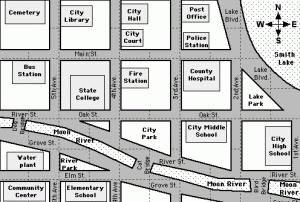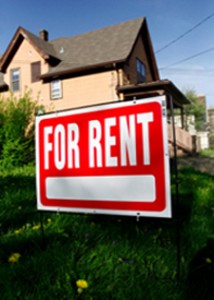Posted by Teresa on December 30, 2009 under Landlord and Tenant FAQs, Rents and Deposits, Screening and Background Checks | 
If one of your New Year’s Resolutions is to increase your cash flow, one way to do so is through application fees. Landlords and property managers use these fees to recover their expenses for background screening, credit checks, and the time it takes to vet a potential tenant.
If you’re really lucky and have several applicants for the same unit, you may opt to screen the best (on paper) applicant first and refund the fees to the remaining applicants. Or, you can screen all at once and choose the strongest applicant. In this case, the other applicants would not receive refunds, since the background check was conducted.
If you decide to keep application fees to cover expenses, avoid issues with applicants by stating very clearly both verbally and on the written application that fees are non-refundable. You’ll also want to determine your policy for refunding fees in the event the tenant changes his or her mind about going through with the rental agreement.
Obviously, a landlord would want to avoid accepting any deposit funds until all background screening has been completed and the tenant’s application approved.
Check your state and local laws for guidance—laws vary greatly and you could face limitations on keeping fees and/or time constraints for returning them. If your application fee policy is questioned, be ready to prove expenses with accounting records. Keep the application fee on a different line item from security deposits and rents in your books.
Smart—and honest—landlords also avoid questions of integrity around fees by only accepting applications for units that are truly available, and by doing some initial screening prior to running the tenant background check. If the applicant’s income is below your minimum, do everyone a favor and just turn down the application.
 If one of your New Year’s Resolutions is to increase your cash flow, one way to do so is through application fees. Landlords and property managers use these fees to recover their expenses for background screening, credit checks, and the time it takes to vet a potential tenant.
If one of your New Year’s Resolutions is to increase your cash flow, one way to do so is through application fees. Landlords and property managers use these fees to recover their expenses for background screening, credit checks, and the time it takes to vet a potential tenant.
If you’re really lucky and have several applicants for the same unit, you may opt to screen the best (on paper) applicant first and, upon approval, refund the fees to the remaining applicants. Or, you can screen all at once and choose the strongest applicant. In this case, the other applicants would not receive refunds, since the background check on each was conducted.
If you decide to keep tenant application fees to cover expenses, avoid issues with applicants by stating very clearly both verbally and on the written application that fees are non-refundable. You’ll also want to determine your policy for refunding fees in the event the tenant changes his or her mind about going through with the rental agreement.
Obviously, a landlord would want to avoid accepting any deposit funds until all background screening has been completed and the tenant’s application approved.
Check your state and local laws for guidance—laws vary greatly and you could face limitations on keeping fees and/or time constraints for returning them. If your application fee policy is questioned, be ready to prove expenses with accounting records. Keep the application fee on a different line item from security deposits and rents in your books.
Smart—and honest—landlords also avoid questions of integrity around fees by only accepting applications for rental units that are truly available, and by doing some initial screening prior to running the tenant background check. If the applicant’s income is below your minimum, do everyone a favor and just turn down the application.
Posted by Teresa on December 28, 2009 under General, Housing Trends, Landlord Tips, Marketing for Landlords | 
 Higher rental inventories and overbuilding, plus foreclosed homes and job losses combined to create one tough rental market in 2009—and it’s predicted to continue through 2010.
Higher rental inventories and overbuilding, plus foreclosed homes and job losses combined to create one tough rental market in 2009—and it’s predicted to continue through 2010.
So what will make your rental property stand out from the rest? With tenants in the driver’s seat, asking for lower rents and other amenities, what can landlords and property managers offer them? What do quality tenants want?
Price, price, price: Tenants want to be sure the rent is in line with the going market rate.
Location, location, location: Parents want to be close to their child’s school. Most everyone prefers to be close to their work. Students like to be close to campus and to nightlife. Families want to be close to parks, grocery stores, downtown, the library—you get the picture. Convenience is a big factor.
Cleanliness: A spotless rental unit will appeal to everyone.
Fitness facilities: Apartment complexes with a bright, clean fitness room with newer equipment that works properly will score higher with most tenants.
Garages: A garage with an automatic door opener is a big draw to most mid-to-upper income tenants.
Appliances: Dishwashers are almost a must. Everybody loves washer/dryer hookups. And if your rental has the washer and dryer as well, it will be scored higher than one without.
Closets and storage: People need space to store their stuff. Lots of closets inside, plus decent outdoor storage for their toys are most appreciated by higher-income tenants.
Accessibility: For older renters and those with physical limitations, easy access to the property shows that you care (and for certain properties, is mandated by law).
Think about the type of tenant you want to attract, and add the improvements that will attract them. If your rental unit already has everything your target tenant wants, make sure your advertising says so!
We recommend you also automatically screen all tenants as part of your application process. For more landlord resources, including forms and information on tenant screening, turn to E-Renter.com. .
Posted by Teresa on December 23, 2009 under Landlord Tips | 
 As we close the books on 2009, here are some tips to keep your rental properties in good condition and your tenants safe:
As we close the books on 2009, here are some tips to keep your rental properties in good condition and your tenants safe:
While it’s not cold everywhere in the winter, frozen pipes are not unknown to even Florida landlords. So if you know freezing temperatures are in store, check your pipes! Call your tenants and remind them to leave a little water dripping and the under sink cabinet doors open.
If your tenants celebrate the holidays with indoor trees and exterior lights, it’s a good idea to stop by and check that overloaded circuits are not a concern. Too many house and apartment fires are started by Christmas trees. Your rental agreement should clearly state what holiday lighting is allowed—but a personal inspection is also a very good idea.
Make sure your tenants are not using space heaters improperly—if at all. Portable and fixed space heaters are associated with nearly 22,000 residential fires each year in the U.S., with approximately 300 deaths. They should not be used to warm beds, dry clothing, thaw pipes, or cook food. They can be dangerous, and should be avoided. If heating systems function properly in your rental units, there should be no need for space heaters.
If you allow smoking in your rentals, this is a good time to remind tenants of proper disposal of smoking materials. No smoking in bed; no placing cigarettes on counters or windowsills. Encourage tenants to extinguish cigarettes under running tap water.
Check your insurance coverage for water damage and fire. In fact, the end of the year is a good time to schedule time with your insurance broker or sales representative to review all of your coverage. You do not want to find out you’re underinsured after something catastrophic happens.
Keep your peace of mind by keeping your rental property and your tenants safe into the new year!
Posted by Teresa on December 21, 2009 under Housing Trends, Landlord Tips | 
Some real estate investors are always looking for the next hot market for rentals. Others prefer to keep their purchases of investment property close to home—so they can better manage their properties. Still others are sitting this market out—waiting for home values and rents to stabilize before even thinking about buying additional properties.
Here are a few ideas to consider if you’re going to be searching for investment properties.
Values exist in almost every city or town. Look for older, yet safe neighborhoods that are obviously kept up by owners. Lower home prices often mean better cash flow.
Keep your eyes and ears open for activity. Is your city is planning a rezone of a particular area? Is a previously designated commercial district going residential? Or is an improvement project planned for a particular area? Knowing what’s going to happen can make a big difference In whether an area is poised for rental property growth or decline.
Areas that have been devastated by overbuilding and plummeting employment are ripe for the picking. Bargains will abound in depressed housing markets like Las Vegas and larger cities in California.
If you’re considering buying away from where you live, add in the cost of a property management company to your calculations.
Go where the jobs are. The idea is to pay attention to announcements of large-scale hiring, plant openings, or relocations. Examples are the new Boeing plant to be built near Charleston, SC, or the purchase of the prison in Thomson, Illinois by the federal government. You can even set up a Google alert to tell you when any mass hiring article hits the internet! When the picture starts improving, notice what states have the highest jumps in employment rates.
Go where the students are. We’ve covered the pros and cons of renting to students before. But the rental markets in college towns tend to be more stable—students will always need a place to live, which is a big plus!
 Some real estate investors are always looking for the next hot market for rentals. Others prefer to keep their purchases of investment property close to home—so they can better manage their properties. Still others are sitting this market out—waiting for home values and rents to stabilize before even thinking about buying additional properties.
Some real estate investors are always looking for the next hot market for rentals. Others prefer to keep their purchases of investment property close to home—so they can better manage their properties. Still others are sitting this market out—waiting for home values and rents to stabilize before even thinking about buying additional properties.
Here are a few ideas to consider if you’re going to be searching for investment properties.
- Values exist in almost every city or town. Look for older, yet safe neighborhoods that are obviously kept up by owners. Lower home prices often mean better cash flow
- Keep your eyes and ears open for activity. Is your city is planning a rezone of a particular area? Is a previously designated commercial district going residential? Or is an improvement project planned for a particular area? Knowing what’s going to happen can make a big difference In whether an area is poised for rental property growth or decline
- Areas that have been devastated by overbuilding and plummeting employment are ripe for the picking. Bargains will abound in depressed housing markets like Las Vegas and larger cities in California.
- If you’re considering buying away from where you live, add in the cost of a property management company to your calculations.
- Go where the jobs are. The idea is to pay attention to announcements of large-scale hiring, plant openings, or relocations. Examples are the new Boeing plant to be built near Charleston, SC, or the purchase of the prison in Thomson, Illinois by the federal government. You can even set up a Google alert to tell you when any mass hiring article hits the internet! When the picture starts improving, notice what states have the highest jumps in employment rates.
- Go where the students are. We’ve covered the pros and cons of renting to students before. But the rental markets in college towns tend to be more stable—students will always need a place to live, which is a big plus!
We recommend you also automatically screen all tenants as part of your application process. For more landlord resources, including forms and information on tenant screening, turn to E-Renter.com. .
Posted by Teresa on December 18, 2009 under General | 
 Call them goals, call them promises–call them whatever you want! But jot these ideas down and refer to them often. Here are a few ways landlords and property managers can make 2010 a more successful year.
Call them goals, call them promises–call them whatever you want! But jot these ideas down and refer to them often. Here are a few ways landlords and property managers can make 2010 a more successful year.
1. Don’t hesitate to start eviction proceedings when necessary. We’ve covered those situations before. It’s unpleasant and can be expensive, but in nearly every case, the behavior that necessitates eviction is not going to change.
2. Keep up with your local market to know whether you’re undercharging or overcharging rent. Do the former, and you’re losing money. With the latter, you’ll lose tenants.
3. Properly prescreen tenants—every tenant, every time. Nothing will do more to keep your business secure—and lead to more peace of mind for you. Don’t fall into the “desperate for a tenant” trap. Keep your standards high and you’ll have high-quality tenants.
4. Enforce the rules strictly. Don’t be afraid to let tenants know what you expect, and the consequences for breaking your rules. You’ll have fewer problems and headaches if you are clearly in charge in the landlord/tenant relationship.
5. Treat your income property business like a business. Keep excellent records, regular business hours, and a separate telephone line with voice mail. Avoid getting too personal with your tenants/clients.
6. Establish goals, make a plan and hold yourself accountable for reaching them. Whether it’s a higher cash flow, keeping expenses in line, or purchasing an additional income property, knowing what you’d like to achieve in your business is the first step in getting there.
7. Watch your cash closely. If necessary, establish an emergency fund that you do not touch. Be prepared for major repairs—you never know when you’ll need to replace a roof or fix a flooded basement.
What are your ideas for doing things differently in the new year?
Posted by Teresa on December 14, 2009 under Landlord Tips | 
If you’re a rental property owner or manager who allows your tenants to keep pets you’ve probably been asked if Pit Bulls are allowed. Pit Bulls and other “aggressive” or “dangerous” dog breeds are commonly banned from rental properties. Is this discriminatory?
While it’s probably not a good idea to argue with fans of a particular breed about its merits (or lack thereof), landlords must deal in facts, not opinions.
Fact: all dogs have the capacity to bite and under the right conditions, will do so;
Fact: all dog breeds have their share of gentle and aggressive individuals;
Fact: Pit bulls Dobermans, and Rottweilers are banned from public housing in New York City, as are dogs over 25 pounds;
Fact: Denver, CO banned Pit Bulls in 1989, and again in 2004 after a state law prohibited singling out certain breeds; Kansas City and Miami followed suit
Fact: England bans the breeding of Pit Bulls and three other breeds, and requires owners to muzzle and leash them in public;
Fact: dozens of Insurance companies will not write a homeowner’s policy if certain breeds are on the property;
Fact: dog bites send nearly 368,000 people to hospital emergency rooms every year;
Fact: In 2007, there were 33 fatal dog maulings in the US—nearly double the average of 17 for the 1980s and 1990s;
Fact: According to a study by Merritt Clifton, Pit Bulls, Rottweilers, Presa Canrios (member of the Mastiff group) and mixes of these breeds were responsible for 74% of dog attacks in the US and Canada from September 1982 to November 2006;
Fact: Dog attacks cause over $1 billion in losses for victims in the US every year.
It seems that owning pets is more popular than ever before—and in a tight rental market like the one we’re in currently, not allowing pets can be a disadvantage. However, allowing potentially dangerous pets is a risk to rental property owners. If you do allow dogs, check your coverage with your insurance agent—you may not have a choice other than banning certain breeds on your property.
Whether a landlord allows pets or not—and Pit Bulls or not—is up to each individual. Knowing the facts can help make that decision easier.
 If you’re a rental property owner or manager who allows your tenants to keep pets you’ve probably been asked if Pit Bulls are allowed. Pit Bulls and other “aggressive” or “dangerous” dog breeds are commonly banned from rental properties. Is this discriminatory?
If you’re a rental property owner or manager who allows your tenants to keep pets you’ve probably been asked if Pit Bulls are allowed. Pit Bulls and other “aggressive” or “dangerous” dog breeds are commonly banned from rental properties. Is this discriminatory?
While it’s probably not a good idea to argue with fans of a particular breed about its merits (or lack thereof), landlords must deal in facts, not opinions.
- Fact: all dogs have the capacity to bite and under the right conditions, will do so;
- Fact: all dog breeds have their share of gentle and aggressive individuals;
- Fact: Pit Bulls, Dobermans, and Rottweilers are banned from public housing in New York City, as are dogs over 25 pounds;
- Fact: Denver, CO banned Pit Bulls in 1989, and again in 2004 after a state law prohibited singling out certain breeds; Kansas City and Miami followed suit
- Fact: England bans the breeding of Pit Bulls and three other breeds, and requires owners to muzzle and leash them in public;
- Fact: dozens of insurance companies will not write a homeowner’s policy if certain breeds are on the property;
- Fact: dog bites send nearly 368,000 people to hospital emergency rooms every year;
- Fact: in 2007, there were 33 fatal dog maulings in the US—nearly double the average of 17 for the 1980s and 1990s;
- Fact: according to a study by Merritt Clifton, Pit Bulls, Rottweilers, Presa Canrios (member of the Mastiff group) and mixes of these breeds were responsible for 74% of dog attacks in the US and Canada from September 1982 to November 2006;
- Fact: dog attacks cause over $1 billion in losses for victims in the US every year.
It seems that owning pets is more popular than ever before—and in a tight rental market like the one we’re in currently, not allowing pets can be a disadvantage. However, allowing potentially dangerous pets is a risk to rental property owners. If you do allow dogs, check your coverage with your insurance agent—you may not have a choice other than banning certain breeds on your property.
Whether a landlord allows pets or not—is up to each individual. Knowing the facts can help make that decision easier.
Posted by Teresa on December 11, 2009 under Housing Trends | 
The latest statistics from the US housing market slide point to what may be a new reality—and a key to economic recovery. More Americans than ever are walking away from homes and mortgages they are upside-down in and replacing a monthly house payment with a monthly rent payment.
The combination of mortgage balances that far exceed the value of their home and cheap rents for premium housing is driving people away from the former ideal of home ownership. Statistics gathered from national reports reveal that US home ownership has declined more in the last five years—from 69.2% to 67.6%–than in the last 20.
While some people simply need to save money, due to job losses or other economy-related factors, others appear to be taking advantage of a situation they blame on banks and the economy. Discontinuing mortgage payments and waiting for the bank to kick them out frees up cash for vacations and more restaurant meals.
These so-called “strategic defaults” by homeowners who can afford to pay are projected to exceed one million in 2009, according to credit firm Experian. Folks who purchased overpriced homes with flawed mortgages find that they can still live on golf courses or in exclusive neighborhoods by renting someone else’s foreclosed home.
The strange effects on the economy are two sides of the same coin: banks and investors stand to face huge losses as more people default on their mortgages, leading to potential losses to taxpayers; on the other side is an unprecedented debt relief situation that can put more cash in consumers’ pockets to offset unemployment. According to data provider LPS Applied Analytics, the added cash flow could mean $5 billion per month.
Adding to the rush to mortgage default is the declining stigma in losing a home. When the minority becomes the average person, whatever was wrong becomes okay. The outcome is unpredictable, but for landlords and rental property investors, one upside is more renters coming into the market. Renters with foreclosures on their credit histories.
 The latest statistics from the US housing market slide point to what may be a new reality—and, perhaps, a key to economic recovery. More Americans than ever are walking away from homes and mortgages they are upside-down in and replacing a monthly house payment with a monthly rent payment.
The latest statistics from the US housing market slide point to what may be a new reality—and, perhaps, a key to economic recovery. More Americans than ever are walking away from homes and mortgages they are upside-down in and replacing a monthly house payment with a monthly rent payment.
The combination of mortgage balances that far exceed the value of their home and cheap rents for premium housing is driving people away from the former ideal of home ownership. Statistics gathered from national reports reveal that US home ownership has declined more in the last five years than in the last 20—from 69.2% to 67.6%.
While some people simply need to save money because of job losses or other economy-related factors, others appear to be taking advantage of a situation they blame on banks and the economy. Discontinuing mortgage payments and waiting for the bank to kick them out frees up cash for vacations and more restaurant meals.
These so-called “strategic defaults” by homeowners who can afford to pay are projected to exceed one million in 2009, according to credit firm Experian. Folks who purchased overpriced homes with flawed mortgages find that they can still live on golf courses or in exclusive neighborhoods by renting someone else’s foreclosed home.
The strange effects on the economy are two sides of the same coin: banks and investors stand to face huge losses as more people default on their mortgages, leading to potential losses to taxpayers; on the other side is an unprecedented debt relief situation that can put more cash in consumers’ pockets. According to data provider LPS Applied Analytics, the added cash flow could mean $5 billion per month.
Adding to the rush to mortgage default is the declining stigma in losing a home. When the minority becomes the average person, whatever was considered “bad” or “wrong” becomes “okay.” (Everybody else is doing it, why shouldn’t we?) The outcome is unpredictable, but for landlords and rental property investors, one upside is more renters coming into the market. Landlords must decide how to deal with these new renters—with foreclosures on their credit histories.
Posted by Teresa on December 8, 2009 under Screening and Background Checks, Tenant Credit Checks, Tenant Screening & Background Checks | 
 Tenant screening involves conducting background checks on potential tenants. Typical checks include tenant credit check, criminal background check, and tenant rental history. Landlords and rental property managers also have the option to check previous addresses, identity and name validation, address validation, evictions, liens, bankruptcies, and sex offender status.
Tenant screening involves conducting background checks on potential tenants. Typical checks include tenant credit check, criminal background check, and tenant rental history. Landlords and rental property managers also have the option to check previous addresses, identity and name validation, address validation, evictions, liens, bankruptcies, and sex offender status.
Here are some dos and don’ts to consider when making the decision to screen tenants:
- Do keep the screening process consistent: screen every applicant, every time.
- Don’t make yourself vulnerable to discrimination suits by screening applicants based on appearance or other subjective attributes.
- Don’t skip the tenant screening for an applicant who speaks well or dresses nicely, or the tenant applicant who drives a nice car—again, these are subjective observations that do not mean they will pay rent on time.
- Do protect your other tenants and the neighbors surrounding your rental property by including criminal history in your background check process.
- Do choose your screening service carefully. Are they a Better Business Bureau Accredited Business and Fair Credit Reporting Act (FCRA)-Compliant Consumer Reporting Agency? Is the staff FCRA Certified and Bonded?
- Do ensure that your screening service employs high security measures, such as fingerprint scanners, controlled access, monitored facilities, and proper disposal techniques.
- Don’t use a screening service without nationwide coverage and access to all three credit bureaus.
- Do keep all information learned from a tenant credit report in strictest confidence.
- Don’t neglect to provide a tenant applicant with a copy of the report, and to advise them in writing if you reject them for credit reasons.
Posted by Teresa on December 3, 2009 under Housing Trends | 
 Zillow, the popular home-price website, also conducts surveys of homeowners, and occasionally publishes the results. Last month, their report showed that there is much confusion over pricing and home values.
Zillow, the popular home-price website, also conducts surveys of homeowners, and occasionally publishes the results. Last month, their report showed that there is much confusion over pricing and home values.
In the northeast, home values are rising more than their owners realize. Only 20% of homeowners believed their homes gained value over the past 12 months—but 31% of homes in the region actually did.
To contrast, homeowners in the west are more optimistic—but unrealistic. 28% of homeowners believe their homes gained value, but only 17% actually did!
Nationally, the numbers were 25% of homeowners believing they gained value in their homes and 22% that actually did. 49% believed their homes lost value over the past 12 months—and in reality, a whopping 72% did.
This confusing situation could be why real estate investors and buyers (other than first timers) are holding off on purchasing property—until prices stabilize.The Zillow report also revealed that fewer Americans are underwater in their homes (owing more than it is worth). But, as job recovery remains slow, the 14% of all American mortgages delinquent or already in foreclosure will increase—and put more vacant homes for sale or for rent in a market that is already saturated with more houses and apartments than demand can support.
It looks like the housing recovery real estate investors and landlords have been awaiting is still eluding them. The US Census Dept. reported that one in seven housing units was vacant in the third quarter—the highest number since the government began reporting the data in 1965. Until employment grows again, the outlook for a healthy housing market is less than stellar.
 If one of your New Year’s Resolutions is to increase your cash flow, one way to do so is through application fees. Landlords and property managers use these fees to recover their expenses for background screening, credit checks, and the time it takes to vet a potential tenant.
If one of your New Year’s Resolutions is to increase your cash flow, one way to do so is through application fees. Landlords and property managers use these fees to recover their expenses for background screening, credit checks, and the time it takes to vet a potential tenant.






